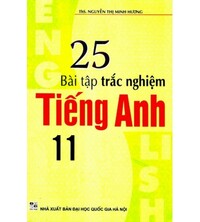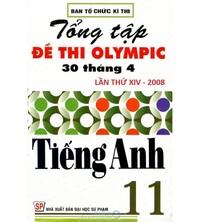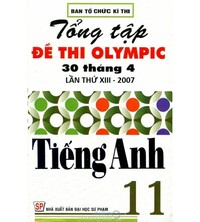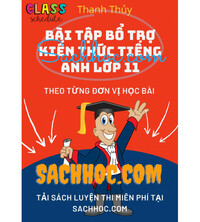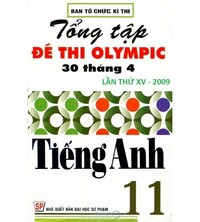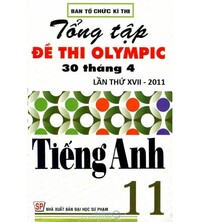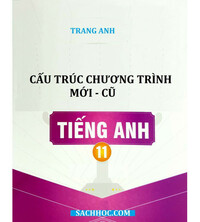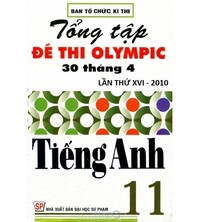Tổng hợp 5 đề thi học kì 2 Tiếng Anh 11 mới có đáp án
I. Choose the correct option (A, B, C, or D) to indicate the word whose underlined part differs from the other three in pronunciation in each of the following questions. II. Mark the letter A, B, C, or D to indicate the word that differs from the other three in the position of primary stress in each of the following questions. III. Choose one word in A, B, C, or D to complete the following sentences. IV. Circle the correct option (A, B, C, or D) to complete each of the following dialogues. V. L
Đề 1
I. Choose the correct option (A, B, C, or D) to indicate the word whose underlined part differs from the other three in pronunciation in each of the following questions.
1.
A. islet
B. island
C. aisle
D. system
2.
A. dome
B. dosage
C. ecosystem
D. tomb
3.
A. peasant
B. decrease
C. leaves
D. peaceful
II. Mark the letter A, B, C, or D to indicate the word that differs from the other three in the position of primary stress in each of the following questions.
4.
A. familiar
B. generate
C. assignment
D. pollutant
5.
A. overcrowded
B. inhabitant
C. geography
D. convenient
6.
A. prevent
B. injure
C. sugar
D. fitness
III. Choose one word in A, B, C, or D to complete the following sentences.
7. Someone who is _______ is hopeful about the future or the success of something in particular.
A. powerful
B. optimistic
C. stagnant
D. pessimistic
8. The medical community continues to make progress in the fight against cancer.
A. speed
B. expectation
C. improvement
D. treatment
9. Instead _____ petrol, cars will only run ____ solar energy and electricity.
A. of / on
B. for / by
C. in / over
D. from/ upon
10. He regretted________ killed and eaten several rare species.
A. to have
B. having
C. have
D. has
11. The local authorities were blamed________ ignored the pollution issues in the area.
A. about having
B. on having
C. for having
D. before having
12. Don't forget to write to me soon,_______?
A. would you
B. could you
C. can you
D. will you
13. Everyone's going to be there, _______?
A. isn't he
B. is he
C. aren't they
D. are they
14. ________ means an illness that can be passed from one person to another, especially through the air people breathe.
A. infectious disease
B. heat-related illness
C. headache
D. stomach ache
15. When finishing an undergraduate course successfully, students can get a ________.
A. master's degree
B. doctoral degree
C. doctorate
D. bachelor's degree
16. Hoi An Ancient Town is preserved in a remarkably_________ state.
A. damaged
B. unspoiled
C. intact
D. unharmed
17. A Bachelor’s degree is a third – year or four – year course you take in undergraduate higher education after you ________ further education.
A. finished
B. have finished
C. had finished
D. have been finishing
18. My elder brother apologized to my parents __________ the simple lifestyle changes they had told him when he was young.
A. for not following
B. for following
C. on following
D. on not following
IV. Circle the correct option (A, B, C, or D) to complete each of the following dialogues.
19.
Mai: My skin is dark and oily. What should I do now?
Liz: __________________________________________
A. I couldn’t agree more.
B. No, please don’t.
C. How about trying our masks with pearl extracts?
D. We should have met more often.
20.
Ha: Well, have you tried mind mapping? In my experience, it is a good way to systematize your information.
Chris: __________________________________________. Thank you.
A. If you wouldn’t mind.
B. Sounds good to me.
C. What? You must be kidding!
D. Yes, please.
V. Listen to part of a news report on United Nation’s determination to control global warming. For each question, decide whether the statements are True or False. Tick (✓) the correct boxes. You will listen to the recording TWICE.
|
|
T |
F |
|
21. The UN report says that harmful effects of greenhouse gases can be eliminated. |
|
|
|
22. Using energy-saving cars and household devices can keep the Earth safe. |
|
|
|
23. Tackling climate change will cost 10% of world economic output. |
|
|
|
24. Rising temperatures are not such a big problem now. |
|
|
|
25. The report emphasizes the need for a wide range of clean technologies. |
|
VI. Read the passage about tourism in Wales and circle the best option (A, B, C, or D) to fill in each numbered blank. An example has been done for you.
It is estimated that in north Wales 30 per cent of all jobs can be directly attributed to tourism, but the fact that visitors spend their money in a variety of ways has a beneficial effect (26)____________ other things too. Many village shops would have to close if they were not supported by income from tourists, and the money spent on local souvenirs can (27)____________ local industries from going out of business.
Unfortunately, tourism also has disadvantages. (28)____________, many of the roads in the Snowdonia area are extremely narrow and tourist cars cause traffic jams. Some farmers and local merchants complain that they make it difficult for them (29)____________ their work as car parks full up during busy periods and many visitors cause obstructions by parking across gateways, etc. In addition, in the summer, thousands of people use the network of footpaths across Snowdon and its foothills. Often the grassy surface is (30)____________, leaving rough stone or mud. This makes the paths hard to see, and it can be dangerous to walk on.
26.
A. to
B. on
C. in
D. at
27.
A. prevent
B. damage
C. avoid
D. hurt
28.
A. However
B. Therefore
C. For example
D. Nevertheless
29.
A. doing
B. to do
C. do
D. did
30.
A. worn out
B. worn off
C. worn down
D. worn away
VII. Read the passage and choose the correct option (A, B, C, or D) to answer each of the given questions.
In 1959, the government of Egypt was working on a plan to build a dam on the River Nile. It was called the Aswan Dam, and it was intended to generate electricity and allow the river water to be used for agriculture. There was one big problem with the plan, though. The dam would flood a nearby valley that contained ancient Egyptian treasures, including two enormous stone temples.
It can be difficult for governments to choose culture and history over economics. However, if countries always made decisions like this, the majority of the world's ancient sites would end up being destroyed. Luckily, UNESCO stepped in. They formed a committee that tried to convince Egypt to protect its ancient treasures. With support from many countries, they were finally successful. The huge temples were carefully removed from their original site and moved to a safe location so that the dam could be built.
After their success in saving the temples in Egypt, UNESCO went on to save more sites around the world. They protected lagoons in Venice, ruins in Pakistan, and temples in Indonesia. With industrialisation changing the world rapidly, there were many sites that needed to be saved. Eventually, UNESCO formed the World Heritage Organisation to protect important natural and historic sites wherever it was necessary.
By now, the World Heritage Organisation has protected hundreds of sites ranging from beautiful natural islands to buildings in large cities and ancient ruins. If you're able to visit any of the many protected sites, you'll agree it was worth it.
31. What is the best title for the passage?
A. UNESCO
B. UNESCO to succeed
C. UNESCO to develop
D. UNESCO to rescue
32. The word “this” in paragraph 2 refers to ____________.
A. culture
B. decision
C. country
D. economics
33. What is meant by the first sentence of the second paragraph?
A. Most governments prefer to sell their treasures.
B. Money sometimes seems more important than all other things.
C. Governments are never able to consider two things at once.
D. Governments usually don't know anything about their culture.
34. Why did UNESCO get involved in Egypt?
A. Egypt was planning to build a dam that would harm ancient temples.
B. Egypt was planning to build a valley for agriculture and electricity.
C. Egypt was planning to create a dam right on top of an ancient temple.
D. When the dam flooded a valley, several treasures were discovered.
35. Why is the World Heritage Organisation more important now than it would have been 200 years ago?
A. Countries didn't cooperate in the past.
B. Cities were smaller back then.
C. There were not as many interesting sites 200 years ago.
D. Modern business and production are changing the world.
VIII. Complete the following sentences without changing their meanings.
36. You press this button to stop the machine. (use conditional sentence)
...................................................................
37. The doctor said to me, “You should lose weight.”
The doctor advised me ...................................
38. “I can’t go to your birthday party next Saturday evening, Jack”, said Mary.
Mary apologized to..........................................
39. After we had read the stories about people who reduced their carbon footprint, we started to change oi daily consumption habits. (use perfect participle)
.....................................................................
40. Chiara spent years trying to pass the First Certificate exam. (took)
......................................................................
-------------THE END-------------
Đề 2
I. Choose the word which has the underlined part pronounced differently from the rest
1.
A. prepare
B. preparation
C. settle
D. effect
2.
A. critical
B. academic
C. university
D. excited
3.
A. cuisine
B. shine
C. pine
D. underline
II. Choose the word which is stressed differently from the rest.
4.
A. supply
B. tourist
C. emerge
D. superb
5.
A. environment
B. responsible
C. environmental
D. response
III. Choose A, B, C or D that best completes each of following unfinished sentence.
6. If you freeze water, it ………………….. solid.
A. becomes
B. become
C. becoming
D. became
7. Nobody called the phone, ………………..?
A. do they
B. don’t they
C. did they
D. didn’t they
8. The government must take measures to cut………………..
A. diversity
B. ecological balance
C. vehicle emissions
D. single
9. ……………….. all necessary preparations, we put our plan into action.
A. Made
B. Have made
C. Having make
D. Having made
10. He denied ……………….. that he would take responsility for the project.
A. saying
B. having said
C. say
D. to say
11. “Think before print” is the slogan to encourage people to save ………………
A. forests
B. soil
C. water
D. fossil fuels
12. I…………………two books on environment protection to complete this assignment.
A. read
B. have read
C. have been reading
D. had read
13. I………………a research since last week. I will finish it this Friday.
A. have studied
B. have been studying
C. are studying
D. study
14. We can improve the ……………… of the inhabitants by reducing pollution.
A. achievement
B. healthcare
C. quality of life
D. transportation
15. Three students were suspected of ………………during the examination.
A. cheat
B. cheated
C. having cheated
D. being cheated
IV. Give the correct form of the word in brackets to complete each of the following sentences.
16. Trang An Scenic Landscape Complex includes both natural and ___ sites. (CULTURE)
17. The young man ____ with the principal is our new teacher. (TALK)
18. The ____ will last for several years as scholars believe that there are still relics buried in this site. (EXCAVATE)
V. Read the text and choose the best option to fill in each blank numbered.
Global warming is the rise in the average temperature of the earth (19) _____the increase of greenhouse gases. Climate scientists now believe that (20) ______ are mainly responsible for this. The burning of fossil fuels and the cutting down of large areas of forests have contributed to the (21) _______ of a large amount of harmful gases into the atmosphere in recent years. The thick layer of these gases traps more heat from the sun, which leads to the increase in the earth’s temperature.
Global warming (22) _______climate change and catastrophic weather patterns such as heat waves, floods, droughts, and storms, which can affect human lives. Hundreds of millions of people may suffer (23) _____ famine, water shortages, and extreme weather conditions if we do not reduce the rate of global warming.
19.
A. so that
B. due to
C. in spite of
D. because
20.
A. humans
B. the old
C. adults
D. the young
21.
A. emit
B. emitting
C. emission
D. emitted
22.
A. brings down
B. results from
C. results in
D. gives back
23.
A. in
B. from
C. during
D. at
VI. Read the text again. Decide whether the following statements are true (T), false (F), or not given (NG).
Changing lifestyles for better health
As a way of living, lifestyle is everyday behaviours, activities, and diet. It involves your work, leisure activities, food and drink consumption, and interaction with people. That is why it is important to have a healthy lifestyle. Although it is often difficult to change your habits, reorganising your daily activities to achieve a healthy lifestyle is not impossible. Here are some steps you need to take to have a better life and health.
Become more active
Scientists have proved that regular exercise can help to reduce cholesterol and the risk of heart disease. Remember that you do not need to do too much exercise - just a 30-minute walk a day will bring health benefits. But it is important that you do it regularly and safely. Simple things like walking or cycling to school, using the stairs instead of the lift, doing the housework and gardening can all contribute to good health.
Moreover, hobbies such as dancing, reading, listening to music, playing chess, and solving crossword or sudoku puzzles are also good ways to keep your body and mind engaged, and increase life expectancy. No matter where you are - at home, at work, or at play - always look for opportunities to be more active and energetic.
Eat healthily
‘Eat to live, not live to eat’ is the advice to follow.The food and drink we consume can dramatically affect our health. Bad nutrition based on fast food, and meals high in fat and sugar can lead to obesity, diabetes, some types of cancer and other chronic diseases. Planning and following a healthy and balanced diet is not difficult at all. Eat the right amount of calories to balance the energy you get from food and the energy you use. Make sure you have a wide range of foods to receive all the nutrients you need. Remember to eat less saturated fat, sugar and salt, and more fish, fruit, and vegetables.
Stay positive and be happy
Once you have started to be more active and eat more healthily, you can notice that you also feel happier. There is no doubt that daily worrying and stress can damage your heart and brain. When you are under a lot of stress, you may get angry easily. Anger and hostility have negative effects on the cardiovascular system. Recent research has confirmed that angry, hostile people live a shorter life. Try to control your anger, always look at the positive side of every situation and be optimistic. If necessary, practise sor-e meditation and yoga to help you to relieve your stress and anger, and enjoy life more.
24. It is not possible to change your daily habits and activities.
25. In order to reduce cholesterol, you need to exercise a lot and work out more than 30 minutes every day.
26. Physical activity should be done not just regularly, but safely.
27. Although fast food may lead to obesity, it has some definite advantages.
28. You should consume less fat and more sugar to balance the energy you use with the energy that goes into your body.
29. Stress and anger can affect people's life expectancy negatively.
VII. Rewrite the following sentences using the clues given in brackets.
30. He had spent all his money. He decided to go home and ask his father for a job. (having+Vp.p)
………………………………………
31. I have met her before. I still remember that. (having+Vp.p)
………………………………………
32. Trang An Scenic Landscape Complex is the eighth World Heritage Site in Vietnam that has been recognised by UNESCO. (Reduce relative clause)
………………………………………
33. Neil Armstrong was the first man who walked on the moon. (Reduce relative clause)
……………………………………
34. I come from a city that is located in the southern part of the country. (Reduce relative clause)
………………………………………
35. “Don’t forget to take your medicine regularly”, Nam’s father told him.
Nam’s father reminded ………………………
VIII. Listen to a short talk and fill in each blank with NO MORE THAN THREE WORDS.
I never used to (36) my health until recently. When I was a kid, I did loads of exercise. Even in my twenties and thirties I was very fit and never ill. I have been lucky all my life – always in the best of health. I rarely get even a cold. I suppose time (37) you. Now I seem to be getting lots of little (38) . I should go to the doctor for a health check, but I’m too busy. The older you get, the more you worry about your health. One good thing is that I’m eating (39) now than ever before. I no longer have fast food and midnight snacks. I also sleep a lot more. I’ve read that getting (40) hours sleep every night is one of the best things you can do for your health.
-------------------THE END-------------------
Đề 3
I. Listen to the conversation twice and mark the best answer for each of the following questions.
1. What does the man usually do on Mondays and Wednesdays?
A. He runs
B. He plays tennis.
C. He does aerobics.
D. He walks.
2. Why does the man lift weights?
A. to improve his endurance
B. to strengthen his muscles
C. to increase his flexibility
D. to run faster
3. Why does the man go hiking on Saturdays?
A. It helps him get rid of his worries from the week.
B. Hiking allows him to burn off weight from overeating.
C. Walking with his dog provides opportunities to enjoy nature.
D. His friend can go hiking with him.
4. What does the man do on Sundays?
A. He relaxes and watches TV.
B. He goes swimming.
C. He goes for a walk.
D. He jogs with his dog.
II. Circle one option (A, B, C, or D) to indicate the underlined part that needs correction in each of the following questions.
5. One of the (A) most important tasks (B) of parents is to teach (C) their kids to live independent(D).
6. I believe (A) that disabilities should not to prevent(B) people from (C) participating fully (D) in our community's life.
7. My father used to giving(A) me some good (B) advice whenever (C) I had a problem(D).
III. Mark the letter A, B, C, or D on your answer sheet to indicate the word whose underlined part differs from the other three in pronunciation in each of the following questions.
8.
A. resume
B. reside
C. preserve
D. conserve
9.
A. laughed
B. cooked
C. played
D. watched
10.
A. yoga
B. expectancy
C. dramatic
D. massage
IV. Mark the letter A, B, C, or D on your answer sheet to indicate the word that differs from the other three in the position of primary stress in each of the following questions.
11.
A. initiative
B. presentation
C. surprising
D. impairment
12.
A. essential
B. survival
C. nutrition
D. vegetable
V. Mark the letter A, B, C, or D on your answer sheet to indicate the correct answer to each of the following questions.
13. Whole grains are high in fiber and contain a variety of that support healthy blood sugar levels.
A. nutrition
B. nutrients
C. nutritionists
D. nutrious
14. We stood on the bridge _____ the two halves of the city.
A. connecting
B. to connect
C. connected
D. connect
15. Mary didn't do her homework last Monday, _____?
A. did Mary
B. did she
C. did her
D. she did
16. The dog _____ you if it hadn’t been tied up.
A. would bite
B. will bite
C. would have bitten
D. bites
17. My own for health is less paperwork and more running barefoot through the grass.
A. routine
B. treatment
C. medicine
D. perscription
18. In most institutions in the UK, the starts in September or October and runs until June or July.
A. calendar year
B. academic year
C. leap year
D. gap year
19. With thousands of UK further education courses on offer, you can choose a course
that your goals and interests.
A. goes
B. mixes
C. fixes
D. matches
20. Humans atmospheric carbon dioxide concentration by a third since the Industrial Revolution began.
A. increase
B. have increased
C. had increased
D. were increasing
21. the desalination plant, the company could offer an effective solution to the problem of water scarcity.
A. To build
B. Having built
C. Being built
D. Having been built
22. Studies reveal that food production will need to increase by 70 percent to the over 9 billion people on the Earth.
A. give
B. supply
C. provide
D. feed
23. Mark the letter A, B, C, or D on your answer sheet to indicate the word(s) CLOSEST in meaning to the underlined word(s) in each of the following questions.
A multitude of people attended the fund-raising presentation in the mall.
A. small number
B. select group
C. huge crowd
D. large herd
24. Mark the letter A, B, C, or D on your answer sheet to indicate the word(s) OPPOSITE in meaning to the underlined word(s) in each of the following questions.
I have to take up my dress. I step on it all the time.
A. try on
B. beautify
C. shorten
D. make it longer
VI. Mark the letter A, B, C, or D on your answer sheet to indicate the sentence that best completes each of the following exchanges.
25. Paul and Daisy are discussing life in the future.
Paul: “I believe space travel will become more affordable for many people in the future.”
Daisy: “______”
A. It doesn’t matter at all.
B. There’s no doubt about that.
C. It is very kind of you to say so.
D. I am sorry to hear that.
26. Peter: “Do you think that we should use public transportation to protect our environment?” – Jerry: “__________.”
A. Yes, it’s an absurd idea.
B. There’s no doubt about it.
C. Of course not. You bet.
D. Well, that’s very surprising!
VII. Read the following passage and mark the letter A, B, C, or D on your answer sheet to indicate the correct word or phrase that best fits each of the numbers blanks.
Deep sleep is important for everyone. The actual amount of sleep depends (27)_____ your age. A young child ought to sleep ten to twelve hours, and a teenager about nine hours. Adults differ a lot in their sleeping habits. For most of them, seven to eight hours a night is (28)_____, but some sleep longer, while others manage with only four hours.
For a good night, having a comfortable (29)_____ to sleep is very important. Also, there should be (30)_____ of fresh air in the room. A warm drink sometimes helps people to sleep, although it is not a good idea to drink coffee immediately before going to bed.
If you have to travel a very long distance, try to go to bed earlier than usual the day before the journey. This will help you to feel more (31)_____ when you arrive.
27.
A. to
B. of
C. on
D. in
28.
A. enough
B. less
C. well
D. few
29.
A. point
B. place
C. part
D. position
30.
A. much
B. many
C. plenty
D. several
31.
A. rest
B. resting
C. rested
D. to rest
VIII. Read the following passage and mark the letter A, B, C, or D on your answer sheet to indicate the correct answer to each of the questions.
In 1959, the government of Egypt was working on a plan to build a dam on the River Nile. It was called the Aswan Dam, and it was intended to generate electricity and allow the river water to be used for agriculture. There was one big problem with the plan, though. The dam would flood a nearby valley that contained ancient Egyptian treasures, including two enormous stone temples.
It can be difficult for governments to choose culture and history over economics. However, if countries always made decisions like this, the majority of the world's ancient sites would end up being destroyed. Luckily, UNESCO stepped in. They formed a committee that tried to convince Egypt to protect its ancient treasures. With support from many countries, they were finally successful. The huge temples were carefully removed from their original site and moved to a safe location so that the dam could be built.
After their success in saving the temples in Egypt, UNESCO went on to save more sites around the world. They protected lagoons in Venice, ruins in Pakistan, and temples in Indonesia. With industrialization changing the world rapidly, there were many sites that needed to be saved. Eventually, UNESCO formed the World Heritage Organization to protect important natural and historic sites wherever it was necessary.
By now, the World Heritage Organization has protected hundreds of sites ranging from beautiful natural islands to buildings in large cities and ancient ruins. If you're able to visit any of the many protected sites, you'll agree it was worth it.
32. What is the best title for the passage?
A. UNESCO
B. UNESCO to succeed
C. UNESCO to develop
D. UNESCO to rescue
33. What is meant by the first sentence of the second paragraph?
A. Most governments prefer to sell their treasures.
B. Money sometimes seems more important than all other things.
C. Governments are never able to consider two things at once.
D. Governments usually don't know anything about their culture.
34. Why did UNESCO get involved in Egypt?
A. Egypt was planning to build a dam that would harm ancient temples.
B. Egypt was planning to build a valley for agriculture and electricity.
C. Egypt was planning to create a dam right on top of an ancient temple.
D. When the dam flooded a valley, several treasures were discovered.
35. Why is the World Heritage Organisation more important now than it would have been 200 years ago?
A. Countries didn't cooperate in the past.
B. Cities were smaller back then.
C. There were not as many interesting sites 200 years ago.
D. Modern business and production are changing the world.
IX. Finish each of the following sentences in such a way that it means the same as the sentence printed before it. Write your answers on your answer sheet.
36. He was frequently criticised for his self-centred attitude but was nonetheless very popular.
=> Frequently
37. Write your paper more carefully or the teacher can’t read it.
=> If
38. He had spent all his money. He decided to go home and ask his father for a job.
=> Having
39. “If you don’t pay the ransom, we’ll kill your son,” the kidnappers said to them.
=> The kidnappers threatened
40. The diagrams which were made by young Faraday were sent to Sir Humphry Davy at the end of 1812. (Use reduced relative clause)
=>
----------------------THE END----------------------
Đề 4
I. Choose the word whose underlined part is pronounced differently.
1.
A. stayed
B. borrowed
C. kissed
D. enjoyed
2.
A. illness
B. climate
C. impact
D. distance
II. Choose the word whose stress is placed in different position from that of the rest.
3.
A. disappearance
B. increasingly
C. situation
D. economic
4.
A. scholarship
B. practical
C. emission
D. flexible
III. Choose the best answer to complete the following sentences.
5. A(n) _________disease is an illness that can be passed from one person to another.
A. dangerous
B. chemical
C. man-made
D. infectious
6. Global warming leads _______ climate change.
A. in
B. to
C. on
D. from
7. Global warming is an increase in the average _______ of the earth’s atmosphere.
A. climate
B. balance
C. temperature
D. vehicle
8. When people finish a postgraduate course, they can get a ____________.
A. baccalaureate’s degree
B. bachelor’s degree
C. master’s degree
D. doctorate
9. When a student enters a college or university, he/she has to choose a main subject of study, which is called ___________.
A. primary
B. training
C. major
D. curriculum
10. Ha Long Bay is wellknown ______ its beautiful scenery.
A. on
B. in
C. of
D. for
11. The Temple of Preah Vihear in Cambodia is composed of a series of sanctuaries ______ by a system of pavements and staircases over an 800 metre long axis.
A. linked
B. linking
C. to link
D. being linked
12. The vegetation layers in Cat Ba Archipelago form spectacular and scenic landscapes and make the site become of all Vietnam's typical ecosystems.
A. home
B. house
C. scenery
D. basis
13. Her classmates admire her so much because she has a clear _________ mind.
A. analysis
B. analytical
C. analytics
D. analyze
14. The public praised the local farmers for millions of trees on the surrounding hills.
A. being planting
B. having planted
C. being planted
D. having been planted
15. Why don’t you take a break? You ________ the Internet all day.
A. are surfing
B. surfed
C. have surfed
D. have been surfing
IV. Give the correct form of the words in the brackets.
16. The lecture is about the ……………….. of the world heritage sites. (preserve)
17. The tour of cave system is the main ………. for tourists in Phong Nha Ke Bang National Park. (attract)
18. Scholars believe that there are still relics buried under the tomb and awaiting ……… (excavate)
19. New York city is facing with the problem of …………… electricity network. (age)
20. Cities will be ………………… and traffic will be heavy. (population)
V. Read the following passage and choose the correct answer to each of the questions.
Though called by sweet-sounding names like Firinga or Katrina, tropical cyclones are huge rotating storms 200 to 2,000 kilometers wide with winds that blow at speeds of more than 100 kilometers per hour (kph). Weather professionals know them as tropical cyclones, but they are called hurricanes in the Caribbean Sea, typhoons in the Pacific Ocean, and cyclones in the Indian Ocean. They occur in both the northern and southern hemispheres. Large ones have destroyed cities and killed hundreds of thousands of people.
Tropical cyclones begin over water that is warmer than 27 degrees Celsius (80 degrees Fahrenheit) slightly north or south of the earth’s equator. Warm, humid air full of water vapor moves upward. The earth’s rotation causes the growing storm to start to rotate around its center (called the eye). At a certain height, the water vapor condenses, changing to liquid and releasing heat. The heat draws more air and water vapor upward, creating a cycle as air and water vapor rise and liquid water falls. If the cycle speeds up until winds reach 118 kilometers per hour, the storm qualifies as a tropical cyclone.
Most deaths in tropical cyclones are caused by storm surge. This is a rise in sea level, sometimes seven meters or more, caused by the storm pushing against the ocean’s surface. Storm surge was to blame for the flooding of New Orleans in 2005. The storm surge of Cyclone Nargis in 2008 in Myanmar pushed seawater nearly four meters deep some 40 kilometers inland, resulting in many deaths.
It has never been easy to forecast a tropical cyclone accurately. The goal is to know when and where the next tropical cyclone will form. “And we can’t really do that yet,” says David Nolan, a weather researcher from the University of Miami. The direction and strength of tropical cyclones are also difficult to predict, even with computer assistance. In fact, long-term forecasts are poor; small differences in the combination of weather factors lead to very different storms. More accurate forecasting could help people decide to evacuate when a storm is on the way.
21. As stated in paragraph 1, tropical cyclones are storms with winds blowing at speeds of ______.
A. more than 100 kph
B. at least 200 kph
C. less than 100 kph
D. no less than 200 kph
22. The word “they” in paragraph 1 refers to ______.
A. sweet-sounding names
B. wind speeds
C. tropical cyclones
D. weather professionals
23. According to the passage, tropical cyclones are called typhoons in ______.
A. the Indian Ocean
B. the Arctic Ocean
C. the Atlantic Ocean
D. the Pacific Ocean
24. Which of the following comes first in the process of storm formation?
A. Liquid water falls.
B. Warm, humid air moves upward.
C. Water vapor condenses.
D. Wind speed reaches 118 kph.
25. The word “evacuate” in paragraph 4 mostly means ______.
A. move to safer places
B. make accurate predictions
C. take preventive measures
D. call for relief supplies
VI. Fill in each numbered blank with one suitable word or phrase.
Like any other universities, the Open University can give you a degree. However, you don’t have to ___(26)___ working to study. It can also open up a whole variety of interest. If you have ___(27)___ studied before, you will enjoy the special, new pleasure of increasing your knowledge. You will make friends of all kinds. You may also find that your qualification provides new career opportunities.
You don’t actually ___(28)___ to the Open University for lectures, but study at home, using television, radio and computer software. You can ___(29)___ one class a month if you wish at an Open University center. Of course, there are exams to take, as in any universities. If you ___(30)___ like to know more, all you have to do is complete the form below. It could be the start of a wonderful new period in your life.
26.
A. stop
B. end
C. break
D. leave
27.
A. ever
B. never
C. often
D. always
28.
A. join
B. enter
C. arrive
D. go
29.
A. give
B. attend
C. learn
D. study
30.
A. did
B. will
C. would
D. can
VII. Rewrite the following sentences using the hints in the brackets or the words given.
31. The building is the highest one in our city. It was destroyed in the earthquake. (using participle)
......................................
32. The man is our English teacher. He talked to you yesterday. (using participle)
.................................
33. After she had read her book carefully, she did the exercises confidently.
Having______________
34. Lan had played truant for class. She was accused of it.
Lan _______________
35. Mai started studying her lesson since 7 o’clock. She’s still studying. (been)
Mai ______________
VIII. Listen to a small talk about Laughter and fill in each blank with NO MORE THAN THREE WORDS.
Laughter is what makes the world go round. If you can’t laugh, life would be very (36) _________. The sound of laughter is one of the (37) _________ sounds in the world. Just hearing it makes me smile and want to laugh too. I have to find out what’s funny so I can share the joke or share the fun. I particularly love the sound of small children laughing. Their laughter is (38) _________. It’s amazing the things they find to laugh about. I think I heard somewhere that laughter is the (39) _________. That’s so true. I also think a good laugh (40) _________you healthy. A few people I know belong to a laughter club. They stand around in circles and laugh. Yes, laughter really is one of the best things we do.
----------------------THE END----------------------
Đề 5
I. Choose the word which has the different stress.
1.
A. academic
B. geological
C. secondary
D. undergraduate
2.
A. intact
B. relic
C. island
D. major
II. Choose the word which has the different pronunciation.
3.
A. doctorate
B. undergraduate
C. appreciate
D. Baccalaureate
4.
A. flood
B. footprint
C. look
D. wood
III. Mark the letter A, B, C or D on your answer sheet to indicate the correct answer to each of the following questions.
5. There are no easy ways to learn a foreign language, _________?
A. are they
B. aren't they
C. aren't there
D. are there
6. Trang An Scenic Landscape Complex, ___________as a World Heritage Site, is famous for its cultural value, natural beauty, ____________ value, and preservation of heritage.
A. featured/ geological
B. recognised/geological
C. dated/cultural
D. considered/ scenic
7. Air water and soil are necessary things to our _________.
A. survivor
B. survival
C. survivalist
D. survive
8. UNESCO's World Heritage List can be seen as a celebration of both the _________ of nature and the greatness of culture.
A. greatness
B. wonders
C. concept
D. humankind
9. Many scientists ________ the blame for recent natural disasters on the increase _________ the world's temperatures.
A. give/ of
B. have/ by
C. take/ to
D. put/in
10. The increase in the earth’s temperature can cause _________ illness which can be dangerous to people.
A. heat-relation
B. heat-relating
C. heating-relate
D. heat-related
11. The excavation relics ____________ from the museum haven't been found yet.
A. stolen
B. prevented
C. invited
D. denied
12. The Citadel gate _____________ in the storm has now been repaired.
A. survied
B. damaged
C. used
D. informed
IV. Read two situations below and choose the best response for each option in A, B, C, or D.
13. Mr. Black: “What a lovely house you have!” - Mr. John: “____________.”
A. No problem
B. Thank you. Hope you will drop in
C. Of course not, it’s not costly
D. I think so
14. John: “Do you feel like going to the cinema this evening?” - Mary: “____________.”
A. I don’t agree, I’m afraid
B. That would be great
C. You’re welcome
D. I feel very bored
V. Supply the correct forms or tenses of the verbs in brackets.
15. Some of the participants ______________ (invite) to the conference couldn’t come because of the bad weather.
16. Take a short break! You ______________ (work) all day.
17. The first book __________ (read) on my summer reading list is “War and Peace”.
18. If you try to mix oil and water, the oil _________ (go) to the top and the water to the bottom.
VI. Read the passage and choose the best answer to fill in each gap.
THE KOREAN EDUCATION SYSTEM
The Korean education system basically consists of primary schools, (19) ............. schools, high schools, and colleges or universities, with graduate courses leading to Ph.D degrees. Primary education is compulsory for children aged six to eleven. The basic primary school curriculum is generally divided into eight (20) ............ : the Korean language, social studies, science, (21) ............., ethics, physical education, music and fine arts. Students in secondary schools are required to take a number of additional subjects, such as English, and can take elective, such as technical or vocational courses. Afterwards, students can (22) ............. between general education and vocational high schools. (23) ............. general, high school tends to be strict, as college and university admission is very competitive.
19.
A. second
B. secondary
C. among
D. half
20.
A. subjects
B. courses
C. topics
D. titles
21.
A. mathematician
B. mathematics
C. mathematically
D. mathematical
22.
A. choose
B. test
C. differ
D. consist
23.
A. On
B. In
C. Of
D. For
VII. Read the following passage and mark the letter A, B, C, or D to indicate the correct answer to each of the questions.
As the twentieth century began, the importance of formal education in the United States increased. The frontier had mostly disappeared and by 1910 most Americans lived in towns and cities. Industrialization and the bureaucratization of economic life combined with a new emphasis upon credentials and expertise to make schooling increasingly important for economic and social mobility. Increasingly, too, schools were viewed as the most important means of integrating immigrants into American society.
The arrival of a great wave of southern and eastern European immigrants at the turn of the century coincided with and contributed to an enormous expansion of formal schooling. By 1920 schooling to age fourteen or beyond was compulsory in most states, and the school year was greatly lengthened. Kindergartens, vacation schools, extracurricular activities, and vocational education and counseling extended the influence of public schools over the lives of students, many of whom in the larger industrial cities were the children of immigrants. Classes for adult immigrants were sponsored by public schools, corporations, unions, churches, settlement houses, and other agencies.
Reformers early in the twentieth century suggested that education programs should suit the needs of specific populations. Immigrant women were once such population. Schools tried to educate young women so they could occupy productive places in the urban industrial economy, and one place many educators considered appropriate for women was the home.
Although looking after the house and family was familiar to immigrant women, American education gave homemaking a new definition. In pre-industrial economies, homemaking had meant the production as well as the consumption of goods, and it commonly included income-producing activities both inside and outside the home, in the highly industrialized early-twentieth-century United States, however, overproduction rather than scarcity was becoming a problem. Thus, the ideal American homemaker was viewed as a consumer rather than a producer. Schools trained women to be consumer homemakers cooking, shopping, decorating, and caring for children "efficiently" in their own homes, or if economic necessity demanded, as employees in the homes of others. Subsequent reforms have made these notions seem quite out-of-date.
24. According to the passage, early-twentieth century education reformers believed that _______.
A. corporations and other organizations damaged educational progress
B. special programs should be set up in frontier communities to modernize them
C. different groups needed different kinds of education
D. more women should be involved in education and industry
25. The word "it" in line 3 in paragraph 4 refers to _____.
A. education
B. production
C. homemaking
D. consumption
26. The paragraph preceding the passage probably discusses _________________.
A. the formal schooling in the United States in the nineteen century.
B. the industrialization and the bureaucratization of economic life the United States in the 19th century.
C. the most important means of integrating immigrants into American society in the nineteen century.
D. the urbanization in the United States in the nineteen century.
27. It can be inferred from paragraph 1 that one important factor in the increasing importance of education in the United States was _________________________.
A. an increase in the number of trained teachers
B. the expanding economic problems of schools
C. the increased urbanization of the entire country
D. the growing number of schools in frontier communities
28. According to the passage, one important change in United States education by the 1920's was that _________________________________.
A. the amount of time spent on formal education was limited
B. most places required children to attend school
C. adults and children studied in the same classes
D. new regulations were imposed on nontraditional education
VIII. Write these sentences as directed.
29. Because the farmers had been told about the dangers of chemical fertilisers, they turned to bio-fertilisers. (Combine the two following sentences using perfect participle)
_______________________________________________________________________________________
30. The students are copying the words which are written on the board. (Turn the relative clause into participle phrase.)
_______________________________________________________________________________________
31. Many animal species/in/danger /extinction/due to/loss/habitat/ inability/adapt/climate change (Use the suggested words or phrases to make a meaningful sentence)
_______________________________________________________________________________________
32. Peter said that he would take responsibility for the project. But then he denied that. (Combine the two following sentences using perfect gerund)
_____________________________________________________________________________________
33. “Stay here! I cant’ let you go out tonight,” her mother said to Jane. (asked)
Jane’s mother ___________________________________________________________________________
IX. Listen to John Keith, a fitness instructor, talking about four types of physical activity and decide if the following sentences are True (T) or False (F).
34. John Keith has been a fitness instructor about ten years.
35. Studies have shown that it’s good for you to do your workout outdoors in the hot and sunny weather.
36. You should also exercise early in the morning when it's not too hot.
37. Cold water can make your blood pressure and heart rate go down.
38. Yoga is completely easy and suitable for people of all ages.
39. The last type of physical activity mentioned is fitness walking.
40. You should drink at least 500 ml for every 15 minutes of walking.
----------------THE END----------------
Search google: "từ khóa + timdapan.com" Ví dụ: "Tổng hợp 5 đề thi học kì 2 Tiếng Anh 11 mới có đáp án timdapan.com"
